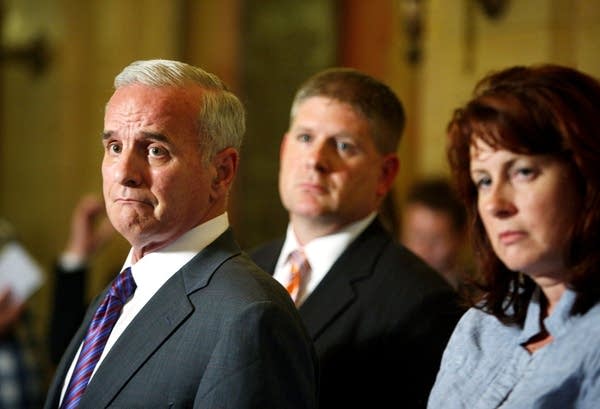Budget compromise reached; ends 15-day shutdown
Go Deeper.
Create an account or log in to save stories.
Like this?
Thanks for liking this story! We have added it to a list of your favorite stories.

Although DFL Gov. Mark Dayton and Republican legislative leaders have agreed on a budget framework to end a 15-day-old state government shutdown, neither side is celebrating the deal that relies heavily on one-time money and pushes a big part of the budget problem into the future.
After two days on the road talking with Minnesotans about the shutdown's effects, Dayton decided he would reluctantly accept a Republican budget offer that he had initially rejected two weeks ago.
The GOP offer would generate about $1.4 billion in new revenue from two sources: it borrows against future tobacco settlement payments to the state, and it increases the amount of deferred state payments to school districts. Dayton said his initial reservations about the use of one-time money initially are still troubling.
"It certainly doesn't put us in a better situation," Dayton said. "But the real solution for Minnesota and for the nation is for the state and national economy to improve and put more people to work and therefore paying taxes."
Turn Up Your Support
MPR News helps you turn down the noise and build shared understanding. Turn up your support for this public resource and keep trusted journalism accessible to all.
Dayton dropped his proposal for an income tax increase on top earners, but insisted that GOP leaders remove all contentious policy provisions from the budget bills, eliminate a proposed 15 percent reduction in the state workforce and pass a $500 million bonding bill. Republican House Speaker Kurt Zellers said the agreement will spend more than the $34 billion Republicans wanted to spend. But he said compromise was necessary.
GOP leaders insist they'll have the votes to pass the agreement, but the criticism is mounting inside and outside of the Capitol.
"It was about making sure that we get a deal that we all can be disappointed in. But it's a deal that is done, a budget that will be balanced, a state that will be back to work," Zellers said. "I don't know that we're all happy at all. None of us got exactly all of what we wanted."
The tobacco bonds were a Republican proposal, but Zellers said he also has concerns about the one-time money. Borrowing is not a perfect scenario, Zellers but added that current conditions are also "an imperfect situation."
Republican Senator John Howe of Red Wing appeared ready to support the deal, despite its flaws. Howe said the budget will remain out of balance and will cause further problems in the future.
"We need to really address the issue. We need to look at the structural balance of our budget, and we cannot continue to do shifts," Howe said.
"Because, are we in fact really going to pay back the K-12 shift?" Howe said.
"So I think, yeah, let's get it done. Let's get Minnesota back operating, but let's not lose sight of the longer term discussion that needs to take place in our state."
Democrats offered mixed reviews of the deal. The House and Senate minority leaders praised Dayton for negotiating an end to the government shutdown, but didn't promise any votes for the budget. DFL Representative Ryan Winkler of Golden Valley said he won't vote for the agreement. Winkler said the deal will compromise the state's future.
"Never before have we borrowed money to pay for ongoing expenses. Never before have we borrowed half of the money we pay to kids every year in order to balance the state's books," Winkler said. "We are going to be paying this money back for years to come, for the simple reason that state leaders are unable to make difficult decisions to balance the state budget."
Criticism also came from outside the Capitol. Former Republican Gov. Arne Carlson, who organized an independent effort to break the budget impasse, said he was dumbfounded. Carlson said borrowing will add to an existing deficit and put the state's credit rating at risk. He said it also delays the political consequences.
"The Democrats will blame the Republicans. The Republicans will blame the Democrats, and it goes on and on and on," Carlson said. "In the meantime, we, the people lose."
Carlson said assuredly that Minnesotans a year-and-a-half from now will again be talking about the state's enormous budget deficit.
The chairs of House and Senate budget committees will meet with Dayton administration commissioners over the next several days to work out details of the spending bills. A special session could come early next week.
Dear reader,
Political debates with family or friends can get heated. But what if there was a way to handle them better?
You can learn how to have civil political conversations with our new e-book!
Download our free e-book, Talking Sense: Have Hard Political Conversations, Better, and learn how to talk without the tension.







